Two, that’s right I said two codex entries for the price of one, my friends! That’s the kind of deal that you can only get here in the Craftworlds codex, so step right up and take a gander at the amazing fighter of fighters, the predator of the skies, the Crimson Hunter! Click to read the CA2018 updated article, or check out the Tactics Corner for more great reviews and strategies.
Overview
Crimson Hunters are one of the more unusual aspects seen on the Eldar craftworlds; unlike the warriors of most other aspect shrines, they do not practice personal combat but instead learn to excel in the piloting of their chosen vehicle, the Nightshade Interceptor. They train in enormous, enclosed “mazes” of crystalline glass where two Hunters will weave, dodge, swoop, and dive, fighting for superior positioning with which to “kill” their opponent. In practice battles, these kills are achieved by painting their opponent with a beam of harmless laser light- but when war comes, the limiters on their laser weapons are removed and they shred targets with lethal gouts of burning energy.
A Crimson Hunter is one of the flyers available to a Craftworlds army. With toughness six, 3+ armor, and twelve wounds they are a nudge less resilient than most other vehicles in the game, at least from a pure stat perspective. As with most vehicles, their melee stats are complete garbage (WS6+, 1-3 attacks, S6) and almost never relevant because of their special rules. With a move value that starts at 20″-60″ they are exceptionally fast, and BS2+ is pretty great on the surface, though it is less amazing than it looks due to reasons we’ll discuss below. At 160pts for the basic loadout, it’s not a horrible option.
However, for 15pts more you can make them into a Crimson Hunter Exarch, which benefits from some extra rules and abilities. Given the extremely low price, I would recommend always doing so, as the old limitation on “only one per detachment” is gone now. Also, for those of you who are looking to build weird, niche armies, they Hunter and Exarch are technically different datasheets, meaning you could theoretically bring three of each in a 2000pts army (though you probably shouldn’t.)
Wargear and Special Rules
As an airplane, Crimson Hunters of all types benefit from the Airborne and Hard to Hit rules, so they cannot charge or be charged in most cases and shooting against them suffers a -1 penalty. Additionally, when they move they must do the special “pivot up to 90, move at least twenty inches, then pivot a second time” method. The fact that they get a second turn after their movement is incredibly important and makes them vastly more flexible than most flyers in terms of movement and targeting- in fact, it even allows you to fly back and forth along a 20″ line maintaining your position if you want, something that only other flyers with Hover Mode can typically do. Lastly, a Hunter that is destroyed may explode for d3 mortal wounds to nearby units, as with most vehicles.
Beyond that, Crimson Hunters benefit from the Skyhunters rule, which allows them to reroll failed wounds against any model with the Fly keyword. Since Fly is such a powerful ability (both for its uses when moving as well as its uses when escaping combat), many armies will do their best to fit at least a few such units into them, so you’ll get to take advantage of this ability much more often than you might think. A lot of players assume that it’s only going to be of use against Tau and Eldar, but DE, Blood/Dark Angels, Necrons, Tyranids, and almost all factions of Chaos will also show up to tournaments with Fly models in their collection, so it can be quite useful.
The Crimson Hunter Exarch also has the Marksman’s Eye rule, which allows them to reroll 1s to hit with their shooting attacks. Although this might seem a bit minor and redundant, it actually is a big boost to accuracy and is a significant part of why I recommend always taking the Exarch over the normal version.
The other reason is wargear. All Crimson Hunters come with a Pulse Laser (S8 AP-3 Dmg3 Heavy 2) on the centerline and two Bright Lances (S8 AP-4 DmgD6) in the wings; the Exarch can choose to swap the latter out for Starcannons (S6 AP-3 DmgD3 Heavy 2) if they wish, which not only makes them a better platform against light vehicles and heavy infantry but also cuts 14 points off of the cost of the unit. Unlike other Craftworlds vehicles, Crimson Hunters (of either type) cannot select items from the Vehicle Equipment list. Do note that because all weapons they can carry are Heavy and they are forced to move at least 20″ each turn (or be destroyed), they will always suffer the -1 penalty for moving and thus functionally have BS3+ rather than 2+.
Uses
The Crimson Hunter is a often-overlooked part of the Craftworlds codex; as of the writing of this article, at least, very few people make much use of them- though I think that will change in the weeks and months to come. However, they are not only extremely resilient (typically enjoying a -2 penalty for any shooting against them and an immunity to charges from most units in the game) but also can dish out 4-6 multidamage shots each turn while being able to move to almost anywhere on the table they care to go. This combination of resilience and heavy firepower is excellent for the Craftworlds army, as it can help fill a gap left by the weakening of Dark Reapers- which is not to say there are no other options for filling that gap, but I think the Hunter is a prime choice for doing so. Oh, and to get this out of the way now: the Exarch is so much superior to the normal version that I can’t realistically envision taking a standard Crimson Hunter in any competitive army, so from here on out when I say “Crimson Hunter” you should mentally tack on the word “Exarch” onto the end of that.
Now, the Crimson Hunter isn’t the deadliest possible option for bringing big guns;in fact, point-for-point, it is outclassed by almost all of the other possible solutions found in in the heavy support section- at least in terms of raw firepower. But if you’re taking a Crimson Hunter, you’re not taking it for the raw firepower; you’re taking it because you want to have a platform that will get to shoot its guns all game long, largely without interference from the enemy. From that perspective, the Hunter is a prime choice, because few other options will match its combination of firepower and resilience together.
The big reason that the Crimson Hunter is so resilient, of course, is the combination of long-range weapons, extreme mobility, and penalties to hit. With an innate -1 against all shooting and another -1 for anyone outside of 12″ (from the Alaitoc trait- there really isn’t any other choice for, even more so than with most units) plus a potential additional -1 from the Lightning Reflexes stratagem if you really, really, really want to stay alive, Crimson Hunters are immensely difficult to bring down. Even when facing up against rerolls, a Crimson Hunter can reasonably expect to survive, two, three, or even four squads’ worth of shooting while still staying on the field. And while it certainly is possible to close within 12″ of them to negate part of the penalties, their speed means that this is probably a one-turn opportunity at best. Now add in the fact that only units with Fly can even attempt to assault it and you have a very, very difficult problem to deal with.
And let’s not forget: the Crimson Hunter’s immunity to most assaults doesn’t just mean that the fighter itself is hard to get to- thanks to its large base, a smart general can (temporarily) use one or more Hunters to block off sections of the field from the enemy, preventing them from moving through those areas. Maybe you need to keep them off an objective- the Hunter may not be able to hold or contest objectives, but it certainly can get in the way such that doing so is difficult for the enemy. Or maybe you want to keep something fast and aggressive (like Genestealers) off of your other units- a “wall” of Crimson Hunters can hold the tide back for a short time, perhaps long enough for you to whittle that horde down into something more managable. This is especially obnoxious for units with large bases, such as Imperial Knights; you give up some of your survivability to do it, but controlling your opponent’s movement can easily be worth all that and more in the right circumstances.
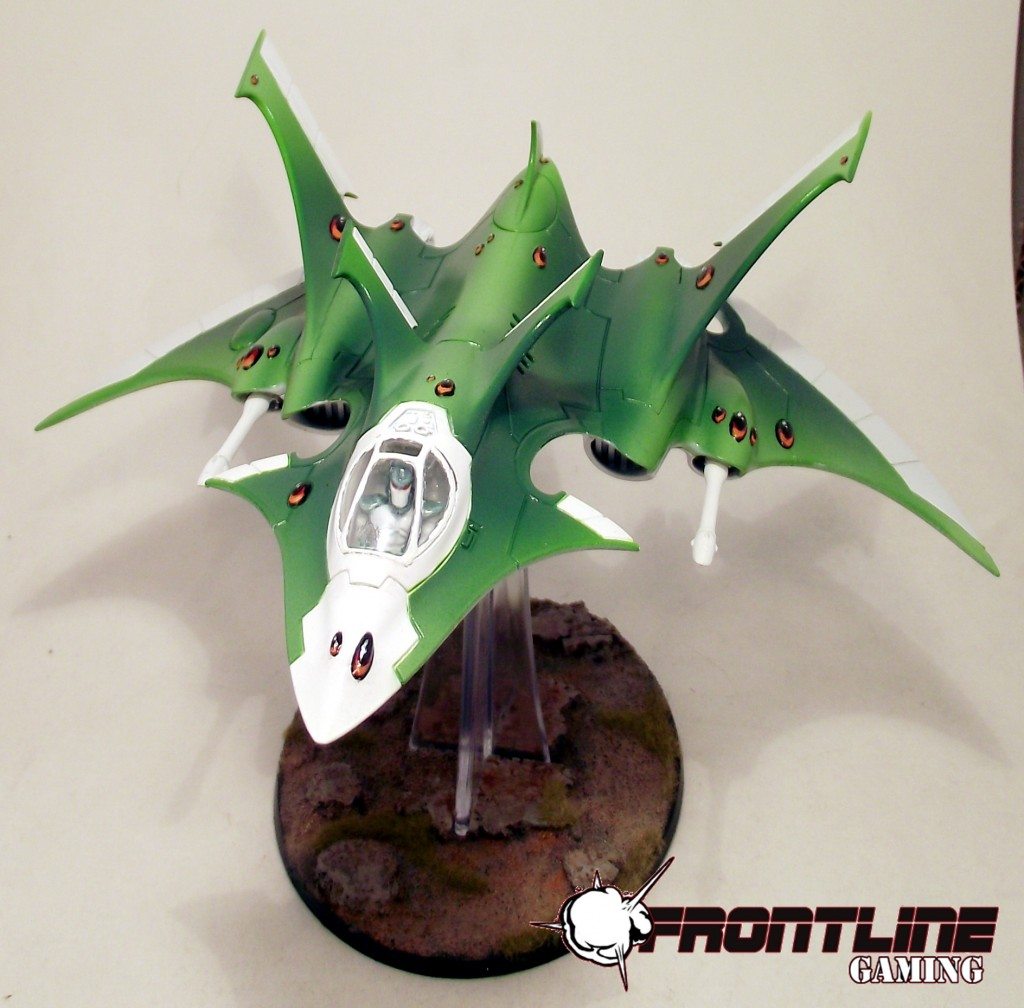
So the Crimson Hunter’s firepower- what about it? We’ve skimmed the topic several times, but never really looked at it in detail. The default loadout gives you four S8 high-damage shots with good AP, which should chew tanks apart pretty handily- wounding on 3s, with a reroll against a fair number of things, is a pretty good place to be. Hitting on 3s (with rerolling 1s all the time) is also pretty accurate, so you can expect to land 2-3 wounds on a vehicle most turns, which should punch through for something in the neighborhood of eight to ten damage ticked off. That’s pretty strong firepower for hunting tanks, all things considered. However, my more preferred loadout these days is the Starcannons replacing the Bright Lances; this gives the Hunter a total of six shots, all with AP-3 and multiple damage; it’s especially terrifying to light vehicles (such as Venoms) and heavy infantry/bikes (such as Veritus Praetors- there’s that Fly keyword again!) where it can consistently wound them and fill multiple pips on their health track with every shot. Although it struggles a bit with T7+ tanks (doing about half as many wounds as the Bright Lances do, unless the target flies), it can still present a nontrivial threat to them- it’s just not as specialized a platform. In an environment where vehicles tend to be either rare one-offs much more so than in 7E/6E, I find that the Starcannons not only cost less but do more work for me most games, so they are certainly my weapon of choice; your own experiences may vary, of course.
One interesting thing that we ought to bring up is enemy flyers. Specifically, the fact that the Crimson Hunter is literally designed to kill them (as per its own fluff), and yet is surprisingly bad at doing so, even when kitted “correctly.” As we’ve already pointed out, BS2+ sounds fantastic until you have to take a -1 for moving and a -1 for Hard to Hit and then factor any degradation into account- at best, a Crimson Hunter finds itself hitting on 4s, and very commonly 5s or even 6s (thanks to enemy special rules, stratagems, etc.) The Hemlock (which we’ll talk more about in a moment) is much better at this role, albeit in a “get them before they get you” sort of way.
That aside, there are many other roles that Crimson Hunters can do well beyond just sitting in the backfield and shooting. We already mentioned move-blocking, of course, but there’s much more beyond that, all enabled by the fantastic speed and maneuverability of the vehicle. Flyers are a prime tool for hunting down unprotected enemy characters- if your opponent gets sloppy with placement, or even just doesn’t have enough models to completely surround them (possibly because you shot those models and they died), a sneaky airplane can easily slip up next to a character and blast them off the table. This is one of the reasons I’m a big fan of the Starcannon- its medium strength, shots, and damage make it a more reliable weapon when shooting a target with an invuln, whereas the Bright Lance can often just bounce off a lucky 4++ or 3++. Similarly, Crimson Hunters can be great for tracking down those small squads hiding somewhere in the enemy backfield and zapping the last couple of guys from the unit, especially things that expect to be “tough” in cover like Space Marines. Their maneuverability can also allow them to bypass cover saves (for non-infantry models, obviously) or BLOS terrain by swooping around to an unprotected side- which may not seem like a big deal when you have AP-3 weapons, but when your opponent starts passing 5+s like a boss you are going to wish you had a way around.
One final thing to consider when looking at the Crimson Hunter is its close companion, the Hemlock Wraithfighter. The Crimson Hunter is cheaper (by 35-45pts, depending on loadout) and has a fairly similar damage-per-point metric against a lot of targets, but the Hemlock comes with some powerful add-ons (such as the psychic powers and anti-leadership aura) that can have a lot of value in the right army. The Hemlock has the advantage in mirror matches thanks to ignoring all penalties to hit and being pretty much completely immune to degradation, but the Hunter is actually more survivable overall due to its ability to keep its distance from potential threats. Neither is strictly superior to the other and you may sometimes find yourself running a mix of both, but if you are considering running one or the other you definitely should pause to think about why you’re choosing the one you picked and if that is the correct choice for that army.
Countering
The Crimson Hunter, like a lot of Eldar vehicles, can be something of a pain to get rid of. However, it does have a number of weaknesses of its own, so it’s not as though it is a perfect little piece. For one thing, although I have certainly touted its toughness enough so far, there are many things that it is not tough against; psychic powers (and anything else that causes mortal wounds) are one big one, as they generally bypass any sort of to-hit roll, which is its main defense. Autohitting weapons can also give it problems, especially the top-end kind such as Heavy Incinerators, Inferno Cannons, etc- the multi-damage kind, generally speaking. With only T6, it is also much more vulnerable to many weapons out there than most vehicles are; Flyrants and other units with S6 or S7 weapons will see a noticeable uptick in their damage compared to other targets.
Additionally, while we have talked a lot about it being “mostly immune” to assault, mostly immune is not wholly immune. There are quite a lot of Fly models in the game these days, and more than a few of them come with strong melee weapons and the incentive to smash things that get too close to them- Shield Captains on Jetbikes, Captain Smashface, and the daemon primarchs are all obvious and common examples of these sorts of units. For units like these, the weak statline and lack of significant overwatch (at least compared to something like a Hemlock) makes the Crimson Hunter easy prey if it does not play very defensively and hold to the back line.
That also brings up another important point- an opponent who invests into multiple Crimson Hunters is not investing those points into units that can sit on the ground and score for them, and since Craftworld scoring units tend to be on the fragile side to start with, this can be very problematic. Simply overwhelming the objectives and taking an early lead while ignoring the Crimson Hunter is certainly an option in ITC games, since they can’t contribute directly to a ground fight. Other types of missions may or may not have this be a possibility, but it’s certainly something to keep in mind.
As the game has progressed, we have also seen more and more factions with the ability to ignore hit penalties, such as Space Wolves, Craftworlds, and Orks; these sorts of units and stratagems are extremely powerful against vehicles like the Crimson Hunter that rely on minuses to stay alive and can spell doom for an army that relies heavily on them for its game plan. We’ve seen some success from such lists in the past, but that probably is something that is over now that those abilities are a cemented part of the game.
Final Thoughts
I think the Crimson Hunter stands a very solid chance of making appearances in competitive Eldar lists of various kinds for quite some while now. It’s not a given at this point, but we’ve already started to see players making use of them and I think that will continue to rise, balanced by some of the other platforms with their own respective strengths that may make appearances instead. But it’s more durable than a Fire Prism and cheaper than a Hemlock, so I think it definitely has the potential to win out in a lot of lists and make the final cut for armies that want to go all the way to the top.
As always, remember that you can get great discounts every day on your wargaming supplies in the Frontline Gaming store, whether you’re looking to start a new army or expand an old one.

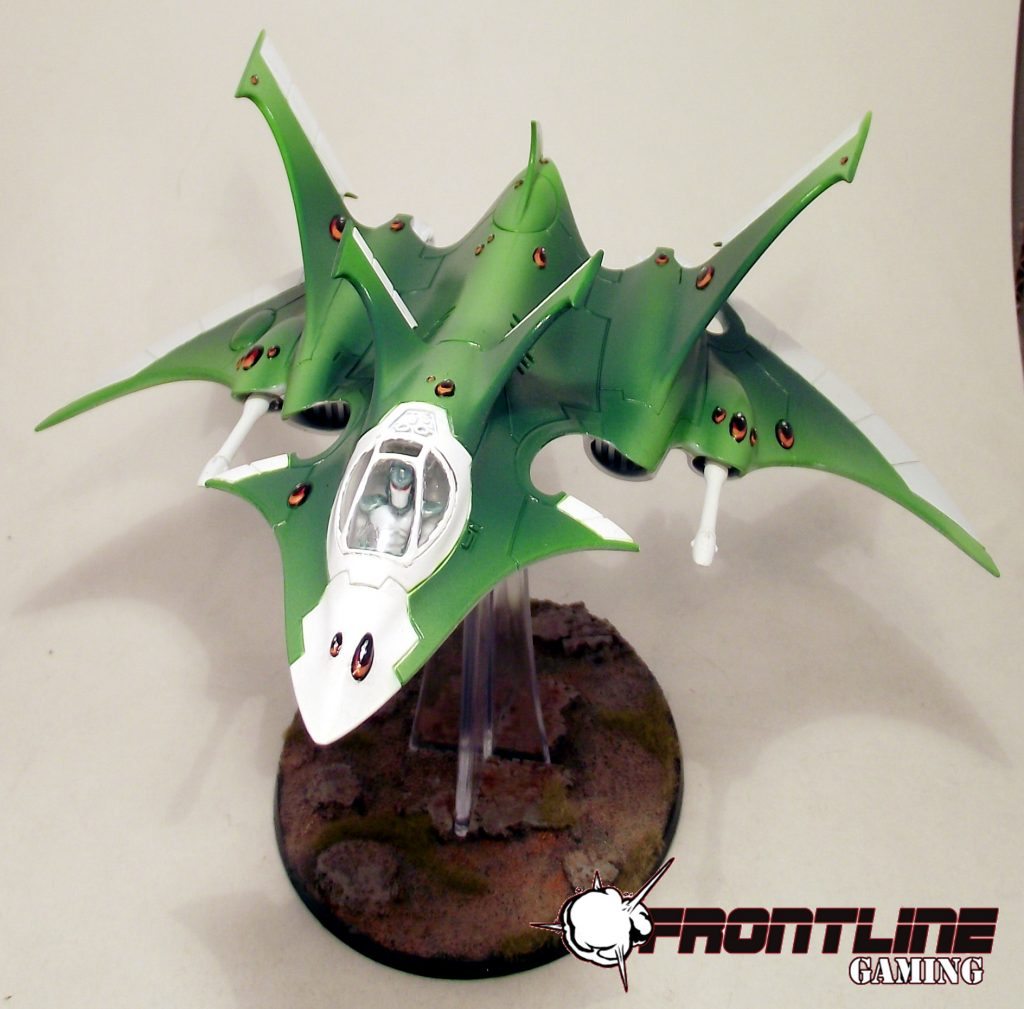
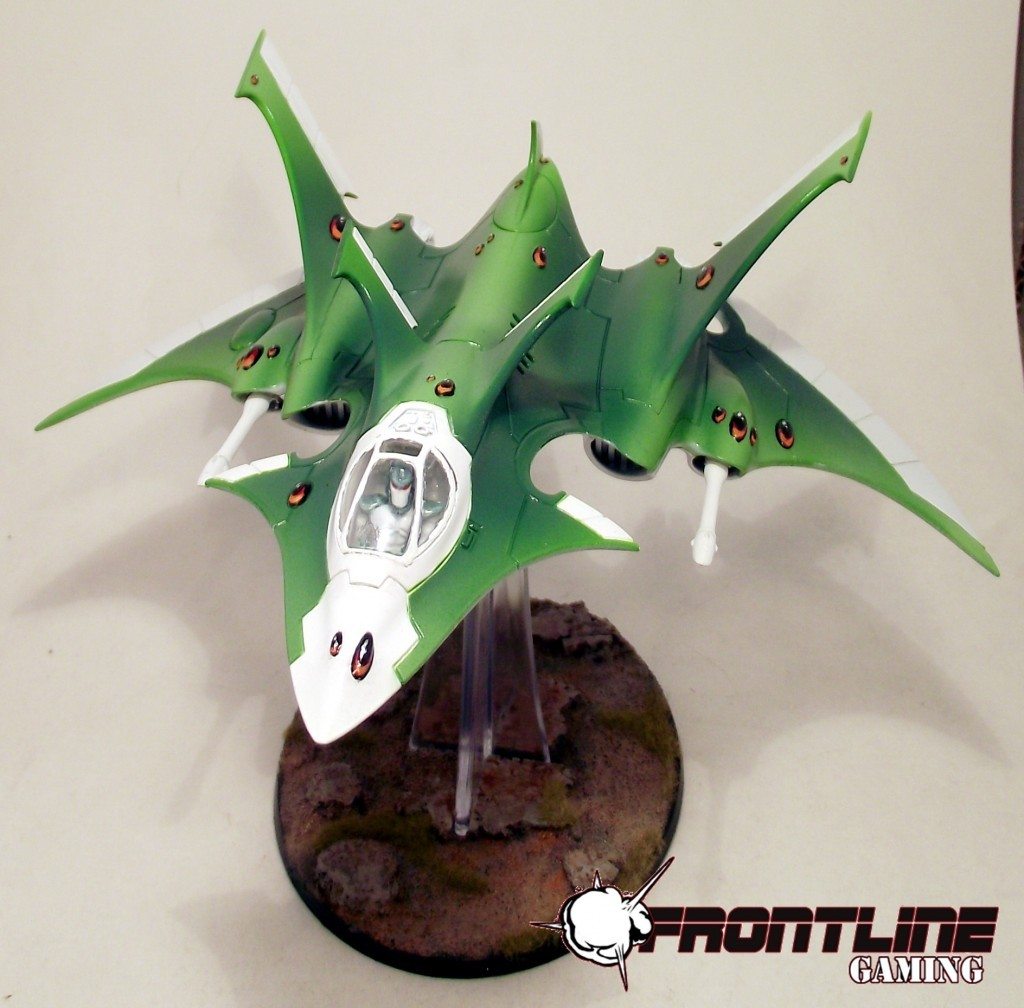
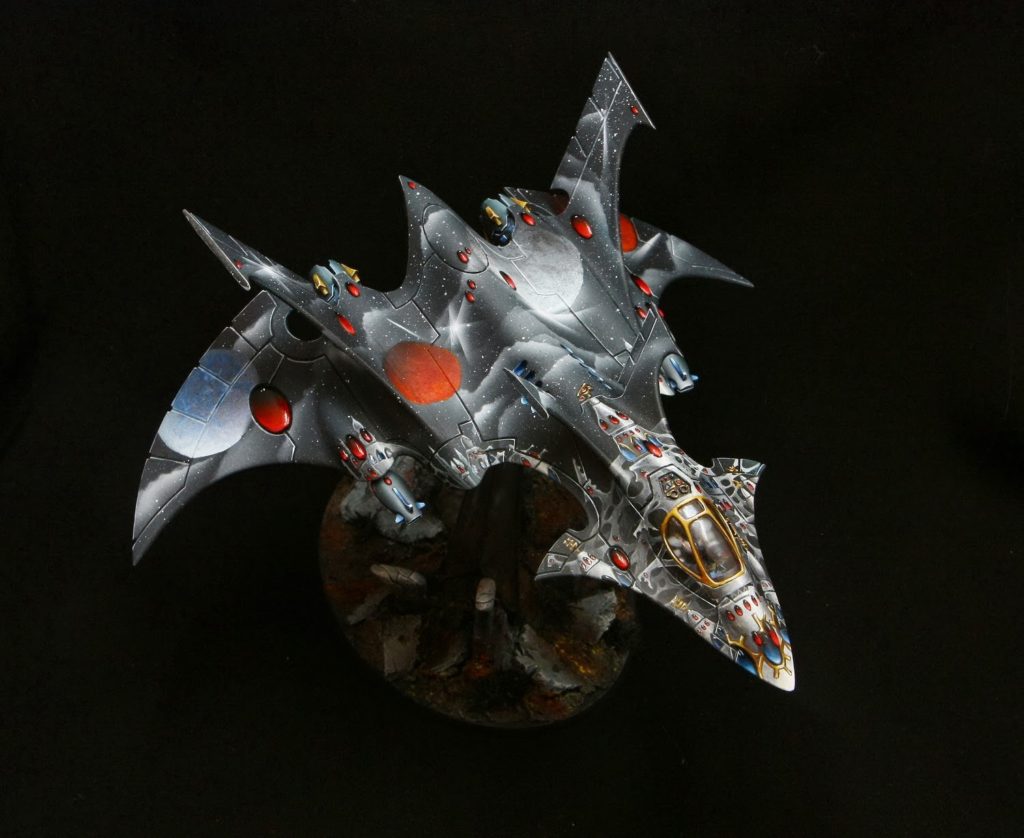
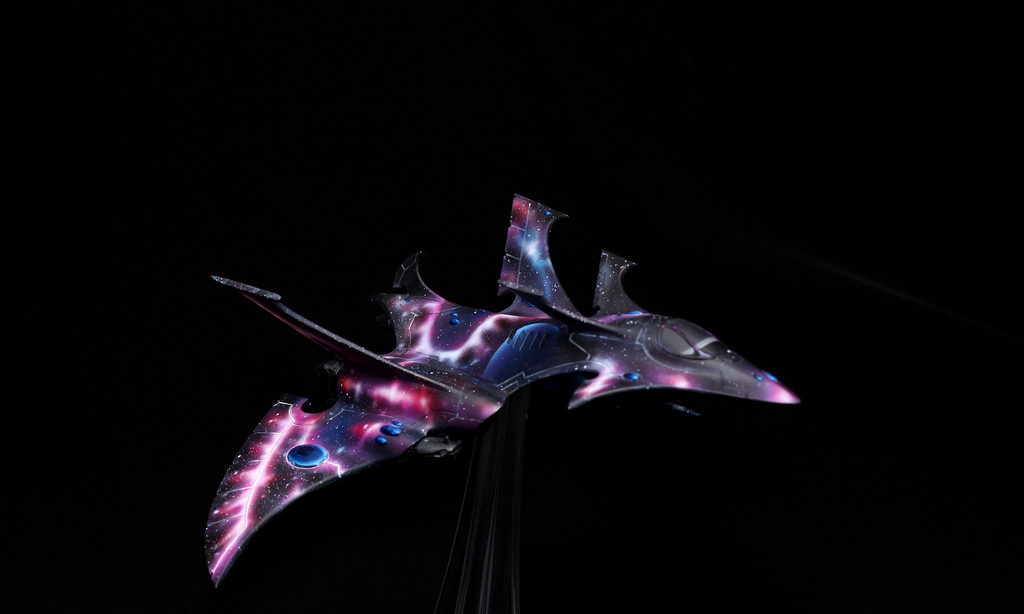
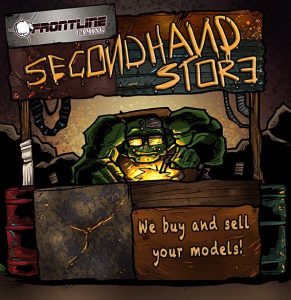
Great article AP. I’m in love with my Crimson Hunter Exarchs. I run two of them every game in my Alaitoc detachment and they absolutely invaluable. There are a ton of Imperial Guard players in my group and they run loads of tanks and these guys have just been absolute aces at removing them. They also excel at removing characters late game when screens and what not have fallen apart too. They’ve got so many built in perks, like re-rolls of 1 to hit, re-rolls damaging against Fly keyword, the -1 to hit, -2 to hit with Alaitoc… it really saves you from investing a lot of command points or psychic powers resources.
I magnetized my flyers but pretty much always run them as a 3 x hemlock airwing detachment under Alaitoc.
As you mention in your article they are pricier, but I find getting the flyers that can smite, deny, and cause leadership problems deep in your opponents deployment is massive.
Takes a lot of fire power to bring down all 3. It’s a large investment at around ~700 pts for the detachment.
You may not be looking at this still, but you can avoid some of the crimson hunter exarch’s drawbacks if you’re running Iyanden. The degrading table is a lot less punishing there. I run a bit of a fluffy/just for fun list, and I have an airwing detachment of two of these and a hemlock. Its a lot of fun to fly around the table and blow away what I want.
Iyanden does lose that all-important -1 to hit bonus at range, though, which I find offers far more protection than the improved degrade chart. I completely understand it from a fluff perspective, but from a competitive one it’s definitely suboptimal.